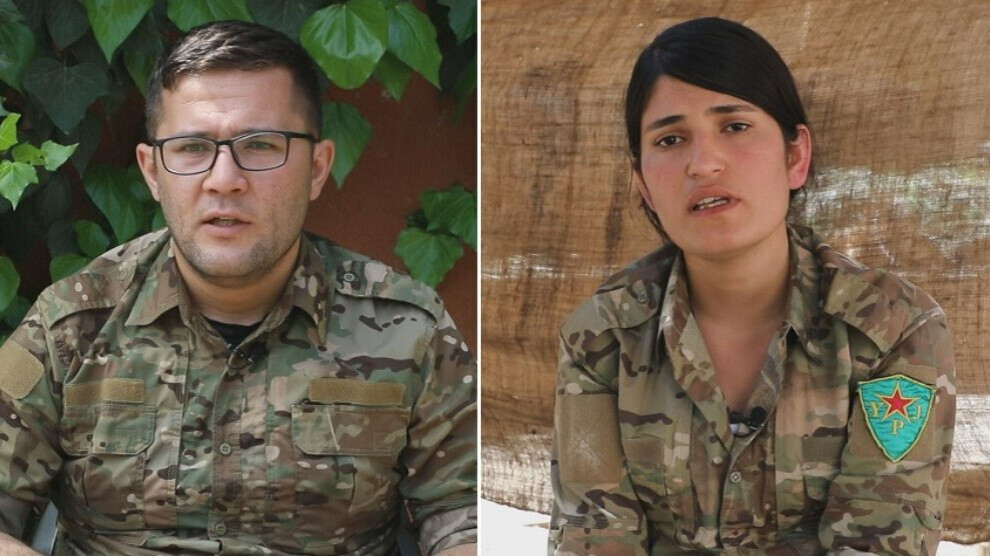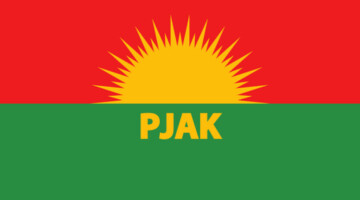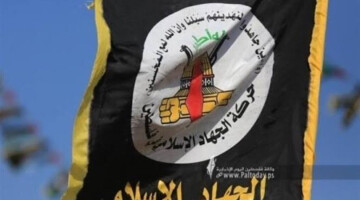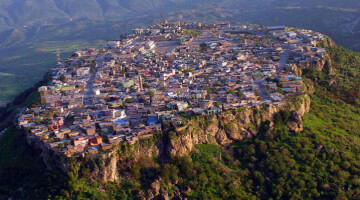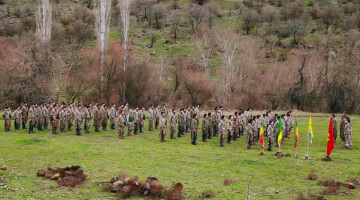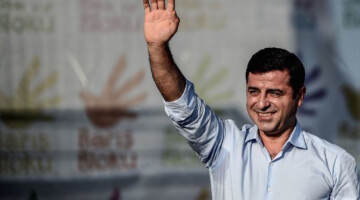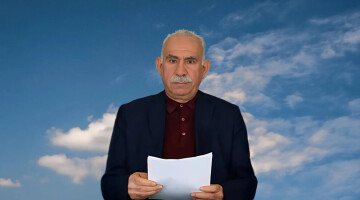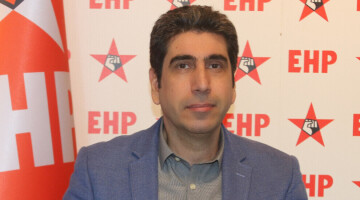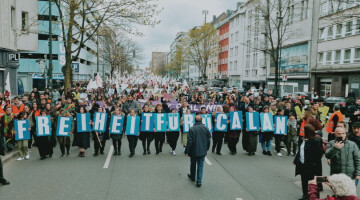Under the pretext of protests against Turkish support for the ISIS attack on the city of Kobanê in West Kurdistan (Rojava), 28 politicians, including the former co-chairs of the HDP, Selahattin Demirtaş and Figen Yüksekdağ, have been imprisoned in Turkey. The trial of the 108 defendants began in Ankara on Monday. The case concerns the uprising between October 6 and 8, 2014, when hundreds of thousands demanded that the borders to Kobanê be opened for humanitarian aid and that support for ISIS be ended. The Turkish state brutally cracked down on the protests, killing dozens of people. In an interview with ANF, fighters from the YPG and YPJ, who defeated ISIS in Kobanê at the time, provide their perspective on the proceedings.
"Turkish pipe dreams shattered by Kobanê resistance"
YPJ fighter Çiçek Dûlî lost an arm in the Kobanê resistance. She remembers the ISIS attack that began on September 15, 2014 and says: "It was not a normal war. It was the first time there was close combat against the ISIS in a city. The ISIS attacked with all its technology and professional force.
Kobanê is a small city, but it is of great importance. It is the city through which Rêber Apo [Abdullah Öcalan] had come to Syria. Kobanê is also where the Rojava revolution began. The city had strategic importance because it connects the areas of Afrin and Cizîrê. For this reason, Kobanê became the main target of ISIS, which was defeated in Kobanê and was subsequently crushed throughout Rojava and north-eastern Syria. The people organized themselves with an autonomous administration based on the model of the democratic nation. This is how Kobanê became the key to freedom. The resistance of Kobanê shattered the pipe dreams of the states behind ISIS.
"The people of Bakur Kurdistan gave us strength"
Dûlî points out how important the struggle of the people in North Kurdistan (Bakur) has been and how this resistance gave them strength and morale: "The people in the north resisted on and beyond the border from September 15, 2014, when ISIS began its Kobanê offensive, until the liberation of the city. That itself was a war in itself. People resisted with their hearts and souls.
At that time, we were not in the situation to watch TV or listen to the news. But we could directly hear the slogans of the people in Bakur across the border. Eventually, the encirclement became tighter and tighter. We were close to the border. The people's slogans gave us strength. Some people crossed the border just to see us. I saw some of these people. One day someone came. We didn't know if he was from Kobanê or Bakur. He introduced himself and said, Comrade, I am from northern Kurdistan. All the people are on the border for you. The whole world is talking about you, all eyes are on you. All of Bakur is on its feet. Everywhere people have gone over to the resistance to support you.'
The war inevitably led to physical and mental fatigue. We resisted, but we were tired. But hearing about this resistance of the people gave us great morale and vitality. When we talk about the victory of Kobanê, we cannot separate this victory from the resistance of the people in Bakur and the young people who came to Kobanê.
"Not the HDP, but the ISIS and its supporters should be prosecuted"
Regarding the trial in Ankara, in which mainly leading politicians of the HDP are standing trial, Dûlî says: "The HDP serves all peoples, women, children as well as the elderly. Such a party can solve all the problems in Turkey today. The development and expansion of the HDP project can end the war, solve economic problems, and stop the femicides. Of course, the Turkish state does not want Turkey to democratize because it is anti-democratic itself. Now the regime is trying to condemn the Kobanê resistance through the HDP. We know from the news that the Turkish government has filled its jails with politicians from the HDP. It is a great injustice to prosecute the HDP today because of Kobanê. This trial is nothing more than open support for ISIS. It is about revenge against the HDP for the defeat of the ISIS. In Kobanê, resistance was mounted for the Kurdish people as well as for all peoples in Turkey and humanity. It is not the HDP but the ISIS and its supporters who should be brought to justice."
"Turkey has supported ISIS in every way possible"
YPG fighter Zerdeşt Dilovan was also injured during the Kobanê resistance. He points out that the Rojava revolution has been targeted by the so-called FSA, the Muslim Brotherhood, Jabhat al-Nusra and ISIS from the beginning until today. All these groups were supported by Turkey and used to attack the revolution. Dilovan says, "The Turkish government provided them with all kinds of support. It also supported the ISIS in the attack on Kobanê.
The ISIS was on the Turkish border in the areas it had occupied in Syria until the Kobanê resistance. But the Turkish government never fired a single bullet at it. On the contrary, it supported ISIS in every way possible. Turkey had become a gateway to Syria for ISIS criminals from Europe and around the world. The ISIS members who came to Turkey were transferred to Syria from areas like Girê Spî and attacked Kobanê even before the major attack.
The beginning of the end for ISIS began in Kobanê. Our resistance and that of the people made sure of that. When you fight against the ISIS and hinder its progress, the Turkish state naturally sees this as an attack against itself. For this reason, it sent the ISIS criminals to Bakur to attack the people and the HDP there. They blew themselves up in Suruç, Ankara, Antep, in short, everywhere where the Kobanê resistance was supported."
Dilovan says the trial now is aimed precisely at the sections of society that supported the Kobanê resistance. He continues, "This trial is political. It is a coup. It is a verdict against the HDP and various segments of society in Turkey. It is about revenge for the defeat of ISIS, which began in Kobanê and ended in Baghouz. The Turkish state wants to take revenge for this on the HDP and the people of Bakur.
“I saw how the ISIS came to Kobanê from Turkey”
Canpolat Fedakar, a veteran of the Kobanê resistance, says: "I saw with my own eyes how the Turkish state sent the ISIS criminals across the Bakur border into Kobanê. North of Kobanê is the village of Til Shair. ISIS members were constantly sent across the border there. We could see that. Sometimes we attacked them. You can't put the ISIS attack on Kobanê and the resistance into words. ISIS attacked with full force and tried to capture Kobanê quickly. As the YPG and YPJ, we resisted this attack with the strength we received from our martyrs and the people. The people of Bakur resisted day after day, month after month, every moment. The four parts of Kurdistan became one heart. The people came to our aid by tearing down the borders and giving us strength."
"Through the HDP, the Kobanê resistance is on trial"
Fedakar sees Turkey's support for ISIS as rooted primarily in the regime's anti-democratic stance and hostility toward the Kurds. He says, "I remember Erdoğan saying during the time of the Kobanê resistance, 'Kobanê is about to fall.' While ISIS was attacking in Kobanê, there was simultaneous fighting between the FSA and the regime forces in Aleppo. Erdoğan and the Turkish press kept putting this war in the foreground. He wanted international forces to help the FSA in Aleppo but not the Kobanê resistance.
Today, the Turkish state is hostile to all Kurds and Rojava. This is its argument against the HDP which seeks a peaceful democratic solution to the Kurdish question. The Turkish state wants to murder us. It does not only target us, but all those who are not like itself and do not obey it. Today, the democratic forces in Turkey and the free humanity must protest against this policy of the Turkish state and the prosecution of the Kobanê resistance."

